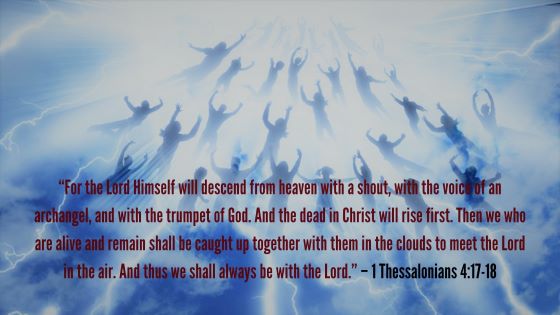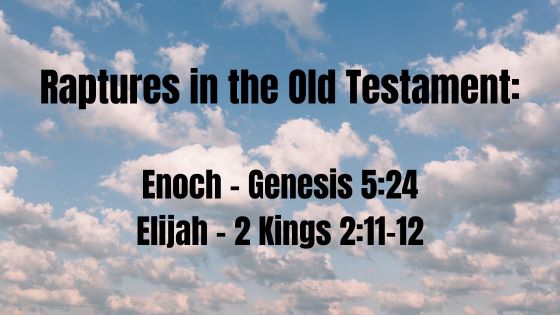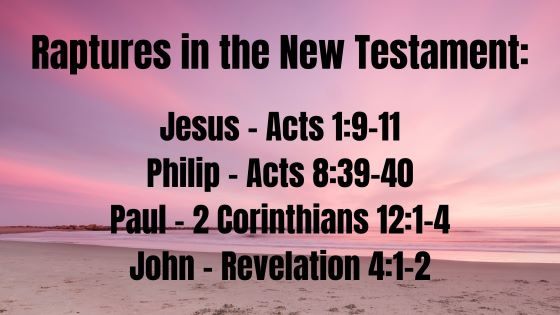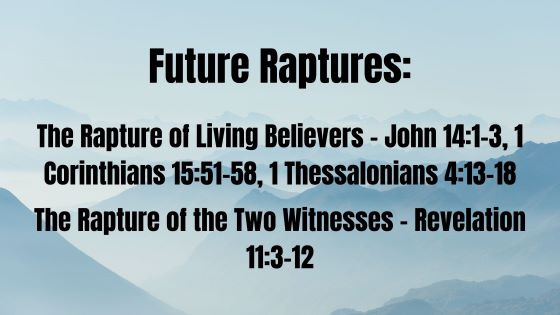The Rapture which is the next great event on God’s prophetic calendar is undeniably one of the most debated issues in Christian theology. Although every Christian denomination affirms its belief in the eventual return of Christ, there exists a wide variety of opinions concerning when and how Christ will return.
In this article, we will examine the biblical doctrine of the rapture.
The Meaning of Rapture in the Bible
Those who object to the rapture are quick to point out that the word rapture is not in the Bible. I must say that’s a fair concern. However, the word Trinity is not in the Bible either, or even the word Bible for that matter. Yet we believe that these things are very real.
So, where does the concept of the rapture come from?
The term rapture comes from the words “caught up” in 1 Thessalonians 4:17: “Then we who are alive and remain will be caught up together with them in the clouds to meet the Lord in the air, and so we shall always be with the Lord.”

Our English word rapture is from the Latin word rapio or raptus, meaning “to snatch up, to seize, or to carry off by force.” When the great scholar Jerome translated the Greek NT into Latin in the 4th century, he translated the Greek word harpazo in 1 Thessalonians 4:17 into the Latin word raeptius. This word was eventually brought into the English as Rapture.
So, while it’s true that the word rapture does not occur in most English translations, 1 Corinthians 15:51-55 and 1 Thessalonians 4:17 clearly contain the concept of a catching away of living believers to meet the Lord.
The rapture could just be well called the “catching away of the church,” “the snatching away of the church,” “the translation of the church,” or “the harpazo of the church.” But “Rapture of the church” is an excellent description and has become the most common title for this event.
Where is Rapture in the Bible?
The rapture of believers is an important biblical concept that appears in the Bible from Genesis to Revelation. The idea of believers being “caught up” by God is not limited to Paul’s letter to the Thessalonians. There are several places throughout the Bible where people were “snatched up” from earth to heaven – providing insight regarding aspects of our future rapture.
There are seven raptures of specific people clearly described in Scripture. These involve Enoch, Elijah, Jesus, Philip, Paul, and the two witnesses. It’s possible that John was raptured as well, which would give us eight.
In light of these raptures, any serious theological understanding of biblical eschatology must include the idea of believers being “caught up” into heaven. Christians may differ on their understanding of the timing of the rapture to come, but not the reality that it will take place.
Interestingly, some critics argue there is no rapture at all for the church. Yet we see the word we refer to as the rapture used 14 times in the New Testament: Matthew 11:12; 12:29; 13:19; John 6:15; 10:12, 28, 29; Acts 8:39; 23:10; 2 Corinthians 12:2; 4; 1 Thessalonians 4:17; Jude 23; Revelation 12:5.
Of these 14 uses of harpazo, four refer to an actual rapture by God. In addition to believers, both dead and living (1 Thessalonians 4:17), these include Philip (Acts 8:39), Paul (2 Corinthians 2:2-3), and the male child (Revelation 12:5).
In addition, several raptures have already taken place in Scripture or are specifically mentioned in the future.
Raptures in the Old Testament
In addition to references to the word translated “rapture” in the New Testament, the Old Testament reveals two occasions on which the Lord “snatched up” a person into heaven. On both occasions, the person was taken alive directly to heaven with the Lord. Thus, the idea of a miraculous rapture of God’s people has precedence in the Old Testament.
Enoch
The first record of such an event has to do with Enoch. He is an intriguing character in Scripture mentioned six times in Genesis, once in a genealogy in 1 Chronicles 1:3, and three times in the New Testament (Luke 3:37; Hebrews 11:5; Jude 14).
Enoch was the son of Jared (Genesis 5:18) and became the father of Methuselah at the age of 65, and later he had other sons and daughters (Genesis 5:21-22). Living in the time of the early patriarchs, he lived to the age of 365. Scripture then notes, “And Enoch walked with God; and he was not, for God took him” (Genesis 5:24).

Elijah
The second Old Testament person taken alive directly into heaven was the prophet Elijah. Elijah, meaning, “my God is Yahweh,” was a 9th century BC prophet from Tishbe, in Gilead, on the east bank of the northern kingdom of Israel (1 Kings 17:7). Elijah’s early ministry involved several confrontations with the idolatrous Ahab and Jezebel, the king and queen of Israel. This reached a climax at Mt. Carmel, where Elijah challenged the prophets of Baal to call down fire from heaven (1 Kings 18:19-39).
Despite God’s miraculous intervention, Jezebel was determined to have Elijah killed, so he fled to the desert and hid in a cave (1 Kings 19:1-9). There, God called Elijah to anoint Elisha as his successor (1 Kings 19:15). Leaving the cave, he found Elisha and “threw his mantle on him” (1 Kings 19:19). For about the next ten years they ministered together, training “sons of the prophets” (disciples) in the various cities of Israel and Judah (2 Kings 2:3).
Second Kings 2 begins, “And it came to pass, when the Lord was about to take up Elijah into heaven by a whirlwind, that Elijah went with Elisha from Gilgal” (2 Kings 2:1). His servant Elisha refused to leave his side, staying with Elijah as they walked to Bethel, Jericho, and across the Jordan River after Elijah parted the water by striking it with his cloak (1 Kings 2:8).
2 Kings 2:11-12 report, “Then it happened, as they continued on and talked, that suddenly a chariot of fire appeared with horses of fire, and separated the two of them; and Elijah went up by a whirlwind into heaven. And Elisha saw it, and he cried out, ‘My father, my father, the chariot of Israel and its horsemen!’ So he saw him no more.”
Raptures in the New Testament
Seven raptures are recorded in the New Testament. These include the ascension of Jesus (Greek, harpasthê) in Revelation 12:50, the temporary raptures of Philip and Paul, the calling up (Greek, anaba) of John, the resurrection and rapture of the two witnesses in Revelation 11:12, and the rapture of all believers in 1 Thessalonians 4:13-18).
Jesus
First, Jesus ascended to heaven following His resurrection. This event known as the ascension is described in Acts 1:9-11. It is also mentioned in Luke 24:51.
What is intriguing about this rapture of Jesus is that the angels reported Jesus will return “in just the same way” as the disciples had watched Him go into heaven. What way was this? Jesus left by being “lifted up” (Greek, epêrthê) and received (Greek, hupelaben) by a cloud.
Jesus’ ascension was physical, personal, visible, and glorious. Jesus promised to one day return in the same way at the second coming (Matthew 24:30; Daniel 7:13) as well as to the same place, the Mount of Olives (Zechariah 14:4).
Philip
The second rapture noted in the New Testament is also recorded in the book of Acts (Acts 8:25-40). In this passage, Philip is led by an angel to meet with an Ethiopian Eunuch. A Hellenistic Jew, Philip was one of the seven original deacons appointed by the church in Jerusalem (Acts 6:1-7).
After Philip successfully evangelized Samaria (Acts 8:1-8), he was led by an angel to head south toward Gaza, on the edge of the Sinai desert. There, Philip encountered an Ethiopian of African descent who was reading from a scroll of the prophet Isaiah. Philip shared the good news of Jesus with the eunuch, speaking from Isaiah 53 in response to the eunuch’s question; “Of whom does the prophet say this” (Acts 8:34)?
“Now as they went down the road, they came to some water. And the eunuch said, ‘See, here is water. What hinders me from being baptized’” (Acts 8:36)? This powerful account chronicles Philip baptizing the first known convert from Ethiopia. But the eunuch’s baptism was not the end of God’s power in this account.
After the baptism, Philip’s rapture occurs (Acts 8:39-40). John R. W. Stott observes, in this case, Philip was “removed with miraculous velocity … as at the rapture.” He was “snatched away” and reappeared at Azotus (Ashdod) some twenty miles away.
Though Philip was only temporarily raptured to another location, this event highlights an important aspect of the future rapture of the church: Those who remain on the earth will no longer see those who were raptured.

Paul
The third rapture recorded in the New Testament involves the apostle Paul. In 2 Corinthians 12:1-4, Paul refers to “a man” who was caught up to heaven. Though he does not directly identify himself in this passage, from the context it is clear that he is speaking of himself.
Though reluctant to speak about his experience, Paul notes several details referring to his being “caught up” to the “third heaven.” The third heaven refers to the place where God lives – beyond the first heaven, or the sky, and the second heaven, or outer space.
First, Paul was raptured “into Paradise.” It was common to speak of heaven as “Paradise” (Luke 23:43; Revelation 2:7). Following his rapture, Paul was in the presence of the Lord immediately. Similarly, 1 Corinthians 15:52 reveals the rapture of believers will take place “in a moment, in the twinkling of an eye.”
Second, this rapture occurred to “a man in Christ.” John Drane sees this concept as the heart of Paul’s theology. He writes, “The supreme fact for Paul was that he was ‘a man in Christ.’ It was by being ‘in Christ’ that a person could be justified before God, and share in the new life Jesus had come to bring.”
Third, Paul “heard inexpressible words.” One of the beautiful aspects believers can anticipate about being in the presence of Christ is the supernatural fellowship that will occur from being with the Lord.
Paul could not even speak of what took place during his experience. Imagine how much greater of an experience it will be when we live in Christ’s presence forever.
John
The fourth possible rapture recorded in the New Testament is found in Revelation. Due to the anti-Christian persecution that took place under the Roman emperor Domitian, the apostle John was banished to the island of Patmos. While there, he continued to worship the Lord and wrote the book of Revelation (Revelation 1:9-11).
In Revelation 4:1-2, John refers back to this vision and says, “After these things I looked, and behold, a door standing open in heaven. And the first voice which I heard was like a trumpet speaking with me, saying, ‘Come up here, and I will show you things which must take place after this. Immediately I was in the Spirit; and behold, a throne set in heaven, and One sat on the throne.”
John Walvoord observes that while the invitation to John to “come up here” (Greek anaba hòde) is similar to that which the church anticipates at the rapture, “it is clear from the context that this is not an explicit reference to the rapture of the church, as John was not actually translated; in fact, he was still in his natural body on the island of Patmos.”
Nevertheless, the idea of his being transported, even in a vision, shows a pattern of a believer being taken to heaven to gain a new perspective on events that would transpire on earth.
Future Raptures
In addition to the raptures that have already taken place throughout Scripture, two future raptures are noted.
The Rapture of Living Believers
While several passages describe the rapture, the three most direct passages that describe this event include John 14:1-3, 1 Corinthians 15:51-58, and 1 Thessalonians 4:13-18.
Note: The focus of this write-up is on the pre-tribulation view of the rapture of all believers in Christ.
In John 14:1-3, Jesus personally describes some aspects of the rapture. First, He explains that one reason for leaving earth is so He can personally prepare a place for us in heaven. This amazing detail reveals Jesus is actively involved in preparing our future heavenly home.
Second, Jesus teaches in John 14:3 that He will come again and receive us to Himself. The order of events is clear. Jesus will leave (the ascension), He will prepare a place for us in heaven, He will come again, He will take us to be with Him (the rapture), and we will be in heaven with Him.

The Rapture of the Two Witnesses
We read about the rapture of the two witnesses sent by God to testify to the world on His behalf in Revelation 11:3-12. God will grant these two Jewish men authority to witness and prophesy for 42 months, or 1,260 days – this comprises the first 3 ½ years of the seven-year tribulation that will follow the rapture (Revelation 11:2-3).
These two men will minister outside of the rebuilt Jerusalem temple and have the ability to destroy their enemies (Revelation 11:5). At the midpoint of the tribulation, the beast (Antichrist) will kill these two witnesses and leave their bodies in the streets of Jerusalem for 3 ½ days (Revelation 11:7-8).
The people of the world will celebrate their death (Revelation 11:10). Yet these two witnesses will return to life after 3 ½ days, causing great fear among the people (Revelation 11:11). They will then follow the Lord’s command to “come up here,” and they will be raptured to heaven (Revelation 11:12).
While the term harpazo is not used to describe the rapture of the two witnesses, the fact of their physical resurrection and rapture is clearly indicated. A voice from heaven called them to “come up here” and they “went up.”
The Rapture is the Blessed Hope
A careful study of the Greek term harpazo and these examples of biblical raptures make it clear that the idea of a future rapture of all believers is certainly biblical. The only real debate is over the matter of the timing of the rapture, not the fact that there will be such an event.
Therefore, any serious discussion about the nature, timing, and significance of the rapture ought to be carried out with the utmost respect for this biblical concept.
If the first Christians viewed the rapture as the “blessed hope” (Titus 2:13), then so should we, regardless of our opinions concerning its timing.
Closing Words
The rapture or the catching away of living believers to heaven is a biblical doctrine. Scripture clearly teaches that at some point in the future, Jesus will come, and every believer in Christ who is alive on earth will be caught up to heaven to meet Him in the air.
One important thing to note: Jesus is not coming for moral people, for people who faithfully attend church, or for people who observe religious rituals, as good as those things maybe. He’s coming for those who are “in Christ” through faith in His atoning death and resurrection.
Are you ready to meet Him?
References:
The End: A Complete Overview of Bible Prophecy and the End of Days by Mark Hitchcock
Can We Still Believe in the Rapture? by Ed Hindson and Mark Hitchcock
Disclaimer: As an Amazon Associate, I may earn a commission when you use any links on this page to make a purchase, but at no additional cost to you.




Great study.
God bless you as you bring forth His Word.
Thanks, Dodi, I appreciate it very much.
God bless you more!
I did not see anything about this being secret. Do you say one way or the other?
Hello Art,
Thanks for taking the time to read the article.
I understand that many Christians often refer to the rapture of the church as something “secret.” This is because it will take place at a time when nobody is expecting it. More importantly, it’s only the church that will participate in this “catching away.”
Unbelievers will know only of this event when they realize that many people have gone missing. It is in this sense that it is called “secret.” ☺